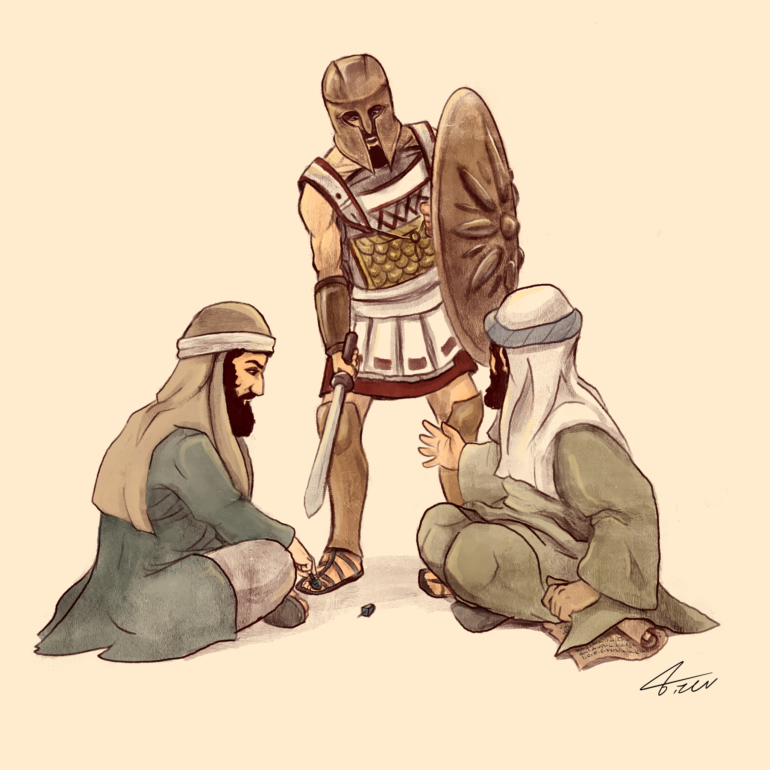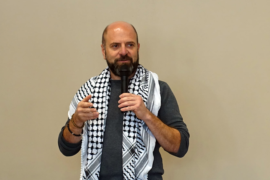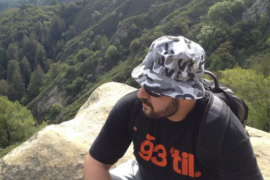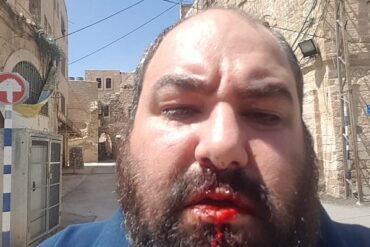The sixteenth chapter of a podcast series on the first Book of Maccabees.
For more content from VISION Magazine, subscribe to our newsletter and follow us on Twitter @VISION_Mag_, Facebook and YouTube. If you haven’t already, don’t forget to subscribe to our podcast on SoundCloud, iTunes, Stitcher, TuneIn, or Spotify and leave a rating and review to help us get our message out to a wider audience!
To support the podcast, head over to our PayPal portal and be sure to write a note that your contribution is for the podcast.
Hosted by: Robert Goodman
Transcript:
Shalom Aleikhem! And welcome back to Sefer Maccabim!
Last time we learned how Antiochus VII sent a messenger to Shimon ben-Matityahu trying to intimidate him into returning the lands he conquered. But Shimon gave him a firm response why the Jews did not actually steal Seleucid lands and how he does not intend to give them away. Antiochus doesn’t disappoint and invades Judea. And now in chapter 16, the final chapter of the first book of Maccabees, we see how Shimon wastes no time in bringing him to a halt.
Shimon, by the way, is an old man by this time, and he has four grown-up children – three sons and a married daughter. We aren’t told his daughter’s name, but his sons Shimon named after his father and brothers. The eldest is named Yoḥanan Hyrcanus, the middle one, Yehuda, and the youngest, Matityahu.
At least the elder two, and possibly the third also, are outstanding soldiers and battle commanders, just like their father and uncles. Now Yoḥanan, the eldest, has been scouting around Judea to see what general Cendebus has been getting up to, and he returns from Gazera by the coast to inform his father of all the damage Cendebus is causing.
Now Shimon gathers Yoḥanan and Yehuda, and tells them, “I and my brothers used to fight for Israel’s sake, and G-D granted us so much success that we delivered Israel many times. But now I’m an old man, so you go instead of me to fight our enemies, and may the Kadosh Barukh Hu be with you.”
Now Cendebus and his army are down in the flatlands, and Shimon’s sons are in the mountains of Jerusalem. So Yoḥanan selects twenty thousand foot soldiers and cavalry, and he and Yehuda lead them west to fight Cendebus. They rest overnight in the foothills of Modiin, then in the morning they come face to face with Cendebus’s army, and it’s huge.
Nevertheless, Yoḥanan and his men are not afraid to fight. But the text tells us how there was some sort of naḥal, a stream, between the two armies, and Yoḥanan’s men are afraid to cross over it. So he himself crosses over first, and his men follow him.
Yoḥanan divides his troops, and achieves a miraculous victory in which Cendebus’s troops flee before his own. Even though his brother Yehuda is wounded during the battle, Yoḥanan pursues the enemy all the way back to Kidron, the town Cendebus fortified, and even as far as Ashdod. Around two thousand enemy soldiers fall on that day, after which Yoḥanan and Yehuda return in peace to Yerushalayim.
If the Book of Maccabees were to stop here, this would make a wonderful ending. Land liberated, peace achieved, last enemy invasion subdued. Unfortunately it doesn’t, and as is all too often in Jewish history, our victories never seem to last long.
Shimon rules Judea as Nasi and Kohen Gadol for a total of eight years, a time of peace for Judea. It could have been longer, but Emperor Antiochus, seeing how Judea is flourishing under Shimon’s leadership, fears Judea will become so strong they will be able to challenge Greece (remember by this time the Greek Empire is on the decline and the Romans are expanding to absorb Seleucid territory into their own empire). So Antiochus hatches a plan to get rid of Shimon.
Shimon’s daughter is married to a man named Ptolemy, who Shimon appointed as governor over Yeriḥo. By virtue of this position and being the Kohen Gadol’s son-in-law, Ptolemy is a powerful and wealthy man. But as it is with human nature, the more you have, the more you want, and Ptolemy gets it into his head that he wants to rule over all Judea. This is just what Antiochus has been waiting for. He speaks with Ptolemy and asks him to kill Shimon.
Antiochus, of course, doesn’t care about Ptolemy himself but he wants Judea to have a weak ruler who will willingly accept Antiochus’s orders, which would effectively allow Antiochus to bring Judea back under Seleucid control by reducing it from a strong, independent entity to a weak country that makes its decisions based on Seleucid interests.
Ptolemy knows nothing of this but he’s drunk on the idea of power and agrees to assassinate his father-in-law.
Now as part of his job, Shimon goes on a journey up and down the country, visiting the people in the towns and villages and taking care of them. As part of his trip he, his wife, and his sons Yehuda and Matityahu pay a visit to Yeriḥo.
When Ptolemy hears they are coming, he thinks, this is the chance I’ve been waiting for, and he graciously invites his father-in-law and his family to a banquet at his military fortress, located just outside Yeriḥo on a mountain called Dok.
Shimon, of course, accepts, he sees this as nothing more than a nice family reunion. What Shimon and his family do not know is that some of Ptolemy’s men are hidden in the building on his orders.
In the middle of the banquet, when Shimon’s family have drunk a lot of wine, Ptolemy orders his men to emerge from their hiding places and they kill Shimon in cold blood, taking his wife and two sons prisoner. It’s a bloody massacre.
Doesn’t this remind you of the awful episode when the governor of Eretz Yisrael, G’dalia ben-Aḥikam, is assassinated at the Rosh HaShana meal by Yishmael ben-Netania?
The similarity between the two cases is striking. The primary difference, however, is that G’dalia was appointed by Nevukhadnetzar as a puppet ruler after the Babylonian king conquered us and destroyed our Beit HaMikdash, and G’dalia’s death meant the death of the last sliver of Jewish independence in our land. Shimon, on the other hand, was the leader of a newly liberated Judea, killed in the wake of a twenty-six year struggle to free our land from the forces of empire. I’m not sure which is worse.
With Shimon taken care of, Ptolemy sends a number of his men to take care of Yoḥanan Hyrcanus, the only son of Shimon not to have been present. Luckily, an unnamed Jew runs ahead to Gazera and informs Yoḥanan that his father and brothers are dead, and Ptolemy is coming to kill him also. Needless to say, Yoḥanan is shocked. But he is now able to escape and runs to Yerushalayim, where word of Shimon’s death has spread and the Jews are furious at Ptolemy. They welcome Yoḥanan with open arms and then when Ptolemy’s soldiers arrive at the city gates, the people band together and drive him away, not allowing him to enter. So Ptolemy returns to his fortress.
While in Yerushalayim, Yoḥanan is appointed Kohen Gadol in place of his father. And officially, the book of Maccabees ends there, but we’ll include one more incident from Josephus’s writings. Shortly after becoming Kohen Gadol Yochanan leads his army to besiege Ptolemy’s fortress, where he hopes to kill Ptolemy and rescue his mother and brothers, who are being held hostage.
He would have taken the fortress easily, but Ptolemy, in an immense display of cruelty, takes Yoḥanan’s mother and brothers up to the battlements atop his fortress in view of the entire army, and proceeds to torture them mercilessly. He threatens that unless Yoḥanan would lift the siege, he would throw them down from the battlements to their deaths. For this reason alone, Yoḥanan goes about relaxing the siege. However, his mother begs him not to have mercy on them, but to storm the castle quickly and execute Ptolemy, for she does not mind this tortuous death, so long as Ptolemy gets his just desserts. This heroic speech by his mother gives Yoḥanan the courage to storm the fortress, but when he sees Ptolemy torturing her again, his nerve fails him. Thus the siege goes on, without Yoḥanan capturing the fortress.
In fact, the siege goes on for so long that a new year begins, which happens to be a Shmita year. Ptolemy decides to end the siege, quickly kills Yoḥanan’s mother and two brothers, and flees Judea.
And on that happy note we’ll end. A big thank you to everyone for listening thus far, but we’re not finished quite yet. We’re going to have two more episodes in this series: one on the aftermath of the revolt and a conclusion to wrap everything up nicely. See you then.





